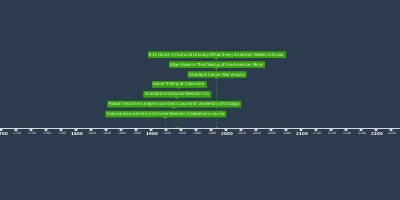mar 17, 1886 - John Lubbock's 100 Great Books for English workers
Description:
from Emily Grosholzhttps://archive.bridgesmathart.org/2017/bridges2017-339.pdf
Birkbeck College, part of the University of London, is named after George Birkbeck, a Quaker, physician
and pioneer in adult education, who gave free lectures on the ‘mechanical arts’ to workmen in Glasgow
around 1800, an initiative that led to the creation of the Mechanics’ Institute there in 1821. When he later
moved to London, he worked with the philosopher Jeremy Bentham and two MPs to create the London
Mechanics Institute in 1823: it became the Birkbeck Literary and Scientific Institution in 1866, and then
Birkbeck College. By the mid-19th century, there were over 700 such institutes in Britain and its colonies.
John Lubbock, 1st Baron Avebury, was Principal of the Working Men’s College in London from 1883 to
1896 (he was also a banker and a scientist); in that capacity, he offered a list of 100 Great Books, all in
English translation, for workers without Greek or Latin, in 1886. The list was widely published and
discussed.
--
http://www.nationalgreatbooks.com/cirriculum/background.html
From Tim Lacy:
"While Frederic Harrison appears to have been the first of these British Victorians to explicitly use the phrase "Great Books" in his 1886 work, The Choice of Books, it was Sir John Lubbock who inspired many to define the best books. Lubbock’s list of the "hundred best books" has since served as the most popular Victorian-era reference point for scholars of that age, and even for later Great Books promoters such as Scott Buchanan and Mortimer Adler.
"Formerly the principal of the Working Men’s College in Britain, Lubbock presented his book list there in a January 1886 ceremony. The Pall Mall Gazette, in a January 11 "Extra," published his entire speech and book list. That "Extra" "sold at least forty thousand copies" and elicited much praise and criticism, and even submissions of Great Books lists from eminent Victorians such as Matthew Arnold, Thomas Carlyle, the Prince of Wales, William Ewart Gladstone, John Ruskin, Cardinal Newman, Herbert Spencer, and Frederic William Farrar. Lubbock’s speech was listed as one of the "world’s best" in a ten-volume list of orations (1900). Lubbock clearly inspired his contemporaries in the spirit of Arnold.
"Lubbock’s speech corresponded with Arnold’s decree to explore the best, but provided practical advice as well. Lubbock began by noting the proliferation of books in the late nineteenth century, but then noted a relatively new problem: the reader’s difficulty in selecting worthy books from the masses of new publications. In addressing the types of "readers the next generation will be," Lubbock pointed to laborers and mechanics. This corresponds with the findings of a recent work by the historian Jonathan Rose. Urban laborers were more likely to spend their leisure time reading than lawyers, doctors, and shopkeepers. Despite their advanced education, the professional classes’ long work hours prevented them from extended reading.
"Lubbock then turned to selecting the best:
"'It is one thing to own a library; it is quite another to use it wisely. I have often been astonished [at] how little care people devote to the selection of what they read. Books, we know, are almost innumerable; our hours for reading are, alas! very few. And yet many people read almost by hazard. They will take any book they chance to find in a room at a friend’s house; they will buy a novel at a railway-stall if it has an attractive title; indeed, I believe in some cases even the binding affects their choice . . . The selection is, no doubt, far from easy. I have often wished some one would recommend a list of a hundred good books.'
"Despite providing for his wish after the address, Lubbock understood the tentative nature of such an endeavor. "Every one who looks at [my] list will wish to suggest other books, as indeed I should myself," he added. His list consisted of eleven categories of not quite one hundred books. Lubbock omitted then-living authors such as Tennyson and Ruskin (too soon to judge, he wrote, despite providing "the keenest enjoyment"), as well as works of science, writing that "the subject is so progressive."" (Tim Lacy)
Added to timeline:
Date:
mar 17, 1886
Now
~ 139 years ago
